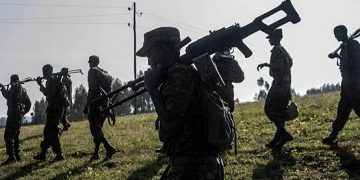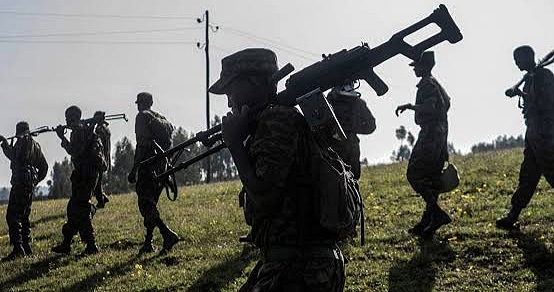By John Ikani
The Tigray People’s Liberation Front (TPLF) has disputed recent statements made by African Union (AU) mediator Olusegun Obasanjo that Eritrean forces have withdrawn from Ethiopia’s northern Tigray region following a truce to end two years of civil war.
TPLF official, Professor Kindeya Gebrehiwot presented evidence in form of an undated picture of Eritrean soldiers in the town of Shire, claiming that the troops are still present in Tigray and not at the border.
He said “The fact is Eritrean forces are still in Tigray, not at the borders! This recent picture shows Eritrean forces in Shire. Tigray had handed over heavy weapons. Eritrean and non-ENDF forces should have concurrently left Tigray as per the pact.”
TPLF spokesperson Getachew Reda also criticized Obasanjo’s comments and said that AU officials should “do their job first before such remarks are made.”
The TPLF, as part of the peace deal with Prime Minister Abiy Ahmed’s administration, has been handing over heavy arms to federal troops.
In addition, TPLF-run Dimtsi Weyane TV reported that an Amhara militia group is allegedly forcing residents in a disputed area between the Tigray and Amhara regions to register as ethnic Amhara.
The Wolkayit-Tsegede region was captured by Amhara forces during the civil war, leading to deadly violence.
The ongoing dispute over the Eritrean withdrawal casts doubts over the effectiveness of the peace deal and the AU’s role in mediating the conflict.
The situation remains tense and it’s unclear what the next steps will be to resolve the issue and ensure a lasting peace in the region.
Why was Eritea involed in Ethiopia-Tigray conflict?
Eritrea became involved in the Ethiopia-Tigray war, also known as the Tigray conflict, in November 2020 when Ethiopian Prime Minister Abiy Ahmed launched a military operation against the TPLF which he accused of attacking a military base.
The TPLF, which had previously been a powerful political force in Ethiopia, had been sidelined by Abiy’s government and had been at odds with him for some time.
Eritrea, which has a long-standing border dispute with Ethiopia and has historically had a tense relationship with the TPLF, reportedly supported Abiy’s military operation by providing troops and equipment to fight alongside Ethiopian federal forces.
Eritrean President Isaias Afwerki has denied that Eritrean troops were involved in the conflict, but there have been multiple reports and evidence suggesting otherwise.
Eritrean involvement in the conflict has been widely criticized by human rights organizations and the international community.
The involvement of Eritrean troops in the war has been reported to have caused mass killings and forced displacement of the population in Tigray, along with reported human rights abuses.




































